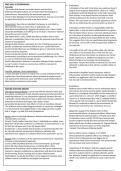Summary
Summary A Level AQA Psychology Issues and debates notes
- Course
- Institution
A Level AQA Psychology Issues and debates notes/summary, including content (AO1) as well as evaluations (AO3) sufficient for writing 16 mark essays for each debate.
[Show more]



